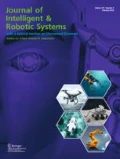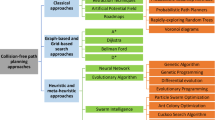Abstract
To extend the utility of multiple mobile robots (MMRs) in formation on a larger scale, the algorithms developed for control of such robots must be robust. The majority of the developed controllers in the literature lack incorporating dynamics of the MMRs or lack robustness in their design. The very few recently developed robust controllers that consider dynamics, either rely on conservative assumptions to obtain robustness, or are sliding-mode based which suffer from the chattering problem. In this paper, (1) we consider both kinematics and dynamics as well as the actuator dynamics and their uncertainties in formulating the formation of non-holonomic MMRs, (2) we develop a novel robust control technique that can effectively handle the unknown parameters and uncertainties in the system, (3) unlike other papers, we relax the conservative assumptions to arrive at control design, and present rigorous mathematical analyses for the development of robust control and prove the system stability based on the Lyapunov theorem. Simulation results proved the effectiveness of the developed robust control method. It was concluded that the proposed control method, while not being conservative, is easy to use and can be readily adopted in real-time experiments.
Similar content being viewed by others
References
Fierro, R., Lewis, F.L.: Control of a nonholonomic mobile robot using neural networks. IEEE Trans. Neural Netw. 9(4), 589–600 (1998)
Yang, J.-M., Kim, J.-H.: Sliding mode control for trajectory tracking of nonholonomic wheeled mobile robots. IEEE Trans. Robot. 15(3), 578–587 (1999)
Fukao, T., Nakagawa, H., Adachi, N.: Adaptive tracking control of a nonholonomic mobile robot. IEEE Trans. Neural Netw. 16(5), 609–615 (2000)
De Luca, A., Vendittelli, M.: WMR control via dynamic feedback linearization: design, implementation, and experimental validation. IEEE Trans. Control Syst. Technol. 10(6), 835–852 (2002)
Park, B.S., Yoo, S.J., Park, J.B., Choi, Y.H.: Adaptive neural sliding mode control of nonholonomic wheeled mobile robots with model uncertainty. IEEE Trans. Control Syst. Technol. 17(1), 207–214 (2009)
Dong, W., Kuhnert, K.-D.: Robust adaptive control of nonholonomic mobile robot with parameter and nonparameter uncertainties. IEEE Trans. Robot. 21(2), 261–266 (2005)
Das, T., Kar, I.N.: Design and implementation of an adaptive fuzzy logic-based controller for wheeled mobile robots. IEEE Trans. Control Syst. Technol. 14(3), 501–510 (2006)
Argall, B.D., Browning, B., Veloso, M.M.: Policy feedback for the refinement of learned motion control on a mobile robot. Springer: Int. J. Soc. Robot. 70, 417–432 (2012)
Chen, Y.Q., Wang, Z.: Formation control: a review and a new consideration. In: IEEE Proc. IROS, pp. 3181–3186. Edmonton, Canada (2005)
Murray, R.M.: Recent research in cooperative control of multivehicle systems. J. Dyn. Syst. Meas. Control 129(1), 571–582 (2007)
Das, A.K., Fierro, R., Kumar V., Ostrowski, J.P., Spletzer, J., Taylor, C.J.: A vision-based formation control framework. IEEE Trans. Robot. Autom. 18(5), 813–825 (2002)
Hu, J., Hong, Y.: Leader-following coordination of multi-agent systems with coupling time delays. Elsevier. Physica A: Stat. Mech. & Apps. 374(2), 853–863 (2007)
Consolinia, L., Morbidi, F., Prattichizzo, D., Tosques, M.: Leader-follower formation control of nonholonomic mobile robots with input constraints. Elsevier. Automatica 44(5), 1343–1349 (2008)
Guo, J., Lin, Z., Cao, M., Yan, G.: Adaptive leader-follower formation control for autonomous mobile. In: IEEE Proc. American Ctrl. Conf., pp. 6822–6827. Baltimore, MD (2010)
Ibuki, T., Hatanaka, T., Fujita, M., Spong, M.W.: Visual feedback leader following pose synchronization: convergence analysis. In: IEEE Proc. American Ctrl. Conf., pp. 493–498. San Francisco (2011)
Luo, X., Nani, H., Xinping, G.: Leader-following consensus protocols for formation control of multi-agent network. IEEE J. Syst. Eng. Electron. 22(6), 991–997 (2011)
Wang, X., Ni, W., Wang, X.: Leader-following formation of switching leader-following formation of switching multirobot systems via internal model. IEEE Trans. Man. Syst. Cybern., Part B 42(3), 817–825 (2012)
Sun, F., Chen, J., Guan, Z.-H., Ding, L., Li, T.: Leader-following finite-time consensus for multi-agent systems with jointly-reachable leader. Nonlinear Anal.: Real World Appl. 13(5), 2271–2284 (2012)
Do, K.D., Lau, M.W.: Practical formation control of multiple unicycle-type mobile robots with limited sensing ranges. J. Intell. Robot. Syst. 64(2), 245–275 (2011)
Gao, Q., Pang, Y., Lv, D.H.: Optimized formation control for motor schema-based multiple robots. Adv. Int. Soft Computt. 125(2), 557–560 (2012)
Chen, P.C.Y., Wan, J., Neow Poo, A., Ge, S.S.: Formation and zoning control of multi-robot systems. Int. J. Robot. Autom. 26(1), 35–48 (2011)
Consolini, L., Morbidi, F., Prattichizzo, D., Tosques, M.: Leader-follower formation control of nonholonomic mobile robots with input constraints. Automatica 44(5), 1343–1349 (2008)
Park, B.S., Park, J.B., Choi, Y.H.: Robust formation control of electrically driven nonholonomic mobile robots via sliding mode technique. Int. J. Control Autom. Syst. 9(5), 888–894 (2011)
Chang, Y.H., Chang, C.-W., Chen, C.-L., Tao, C.-W.: Fuzzy sliding-mode formation control for multirobot systems: design and implementation. IEEE. Trans. SMC Part B 42(2), 444–457 (2012)
Park, B.S., Park, J.B., Choi, Y.H.: Adaptive formation control of electrically driven nonholonomic mobile robots with limited information. IEEE. Trans. SMC Part B. 41(4), 1061–1075 (2011)
Defoort, M., Floquet, T., Kokosy, A., Perruquetti, W.: Sliding-mode formation control for cooperative autonomous mobile robots. IEEE Trans. Ind. Electron. 55(11), 3944–3953 (2008)
Dong, W.: Robust formation control of multiple wheeled mobile robots. Int. J. Robot. Syst. 62(3–4), 547–565 (2011)
Spong, M.W., Hutchinson, S., Vidyasagar, M.: Robot Modeling and Control. Wiley (2006)
Spong, M.W., Thorp, J.S., Kleinwaks, J.M.: The control of robot manipulators with bounded input part II: robustness and disturbance rejection. In: IEEE Proc. Decision. Control.. Las Vegas, NV (1984)
Corless, M.J., Leitmann, G.: Continuous state feedback guaranteeing uniform ultimate boundedness for uncertain dynamic systems. IEEE Trans. Automat. Contr. 26(5), 1139–1144 (1981)
Khalil, H.K.: Nonlinear Systems. Prentice Hall (2006)
Author information
Authors and Affiliations
Corresponding author
Rights and permissions
About this article
Cite this article
Biglarbegian, M. A Novel Robust Leader-Following Control Design for Mobile Robots. J Intell Robot Syst 71, 391–402 (2013). https://doi.org/10.1007/s10846-012-9795-1
Received:
Accepted:
Published:
Issue Date:
DOI: https://doi.org/10.1007/s10846-012-9795-1




